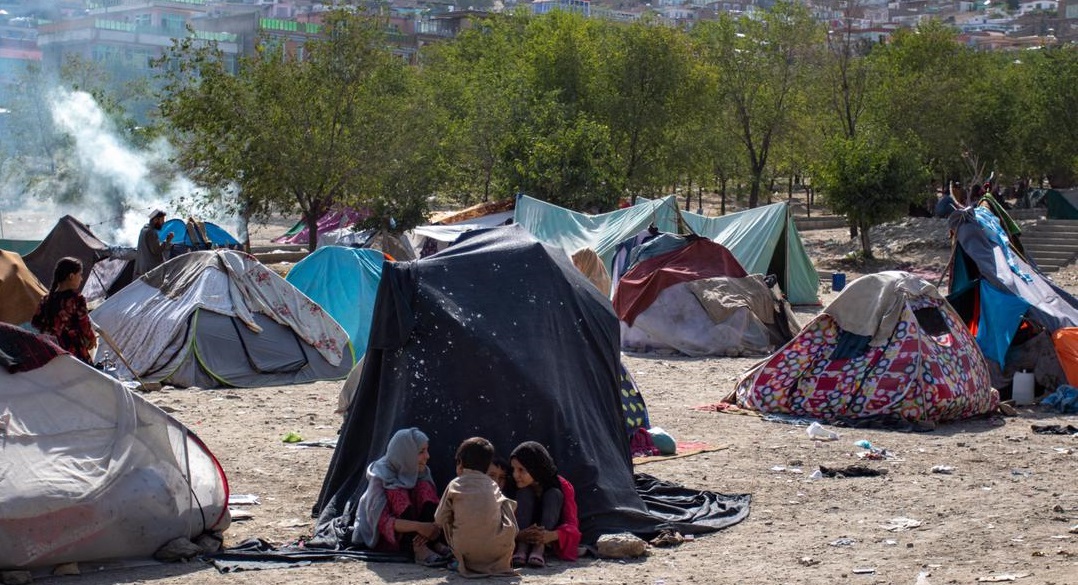 Newly displaced people who have come to Kabul seeking safety are living in vulnerable and often unsanitary conditions exposing them to increased risk transmission of COVID-19 and other infectious diseases. As the Health Cluster lead, WHO is working with partners to ensure the delivery of a coordinated health response to the current emergency.
Newly displaced people who have come to Kabul seeking safety are living in vulnerable and often unsanitary conditions exposing them to increased risk transmission of COVID-19 and other infectious diseases. As the Health Cluster lead, WHO is working with partners to ensure the delivery of a coordinated health response to the current emergency.
24 August 2021 – Over the past week, the eyes of the world have been focused on the political and security changes in Afghanistan, and the consequent emergency evacuation of internationals and vulnerable Afghan civilians.
We all watched scenes of chaos and desperation at Kabul airport with grave concern as men, women and children risked their lives, and some tragically died in efforts to flee the country.
But it is important to note that even before these latest events, Afghanistan was the world’s third largest humanitarian operation due to war, displacement, drought, hunger, and, of course, the COVID-19 pandemic. Over 18 million people – more than half the population – already need humanitarian assistance to survive. And these needs are increasing daily.
As the events quickly unfolded, we had 2 priorities. The first was to ensure the absolute safety of our staff in-country. We have taken a range of steps to increase the security and protection of staff and their dependents, including relocating thousands of Afghan colleagues and their families out of harm’s way to areas away from conflict.
The second priority was to stay and deliver by continuing our life-saving work for the millions of Afghans left behind. This means prioritizing the delivery of life-saving health supplies that health facilities need to stay operational. We rapidly distributed life-saving supplies to health facilities and partners in Kabul, Kandahar and Kunduz. But WHO now only has enough supplies in-country to last for one week. Yesterday, 70% of these supplies were released to health facilities.
More than 500 metric tonnes of medicines and supplies remain in our warehouse in Dubai. They were ready and planned to be delivered to Afghanistan this week. But Kabul airport remains closed to commercial flights, and based on operational and security constraints, countries sending in empty planes to pick up evacuees do not feel they are able to help.
A few days ago, we made a joint call with UNICEF to the international community requesting support to deliver humanitarian supplies to Afghanistan. This includes the immediate establishment of a reliable and robust humanitarian airbridge to send in supplies.
Looking forward, we will also work with the Afghan people and partners to ensure that the health gains of the past 2 decades are not lost. Over these years, WHO and partners have worked with authorities on multiple advances for the health and well-being of the people in Afghanistan. Together, we strengthened a battered health system by training health care workers and delivering lifesaving and essential medicines, medical supplies and medical equipment.
We monitored and responded to disease outbreaks, scaled up the trauma care programme, and ensured that services for women, mothers and children were available even in the most remote and hard-to-reach areas.
As a result of the collective work of many partners and thousands of health care workers, the number of women in Afghanistan dying in childbirth has reduced by 60% and child mortality has reduced by over 50%. Almost 70% of all women now have a chance of surviving to the age of 65, compared to only 54% 20 years ago.
It is more important than ever to keep building on these gains, so that every man, woman and child in Afghanistan has a chance to live a life filled with dignity, good health and hope.
Additionally, Afghanistan is one of only 2 countries in the world that has not eradicated wild poliovirus. With only one case of wild poliovirus reported from Afghanistan and Pakistan each so far this year, now is a critical time and an unprecedented opportunity for the programme in Afghanistan to stop polio and not lose the hard-won gains achieved.
We also need to keep the COVID-19 pandemic under control. Both Delta and Alpha variants have been documented in Afghanistan, and we are concerned that the current upheavals and increasing population movement could lead to a spike in cases. With less than 5% of the population fully vaccinated, the conflict is impacting COVID-19 vaccination across the country and delaying routine immunization, which could lead to further outbreaks.
As the current events continue to unfold, WHO is fully committed to staying and delivering in Afghanistan. Today, WHO has a network of 684 staff and health workers inside the country, working in all 34 provinces. Despite the challenges and ongoing insecurity, they remain committed to deliver on our collective mandate. And they are being supported by specialized teams at all levels of the Organization.
We now need the support of our donors and partners to count on us, work with us, and help us to save lives, promote health and serve the vulnerable.
I would like to end my remarks with a message to the people of Afghanistan: for 70 years we have been serving you, and we remain with you. We stand in solidarity with you, and we place your lives, health and well-being as our top priority based on our regional vision of Health for All by All: a call for solidarity and action. We will not fail you.




